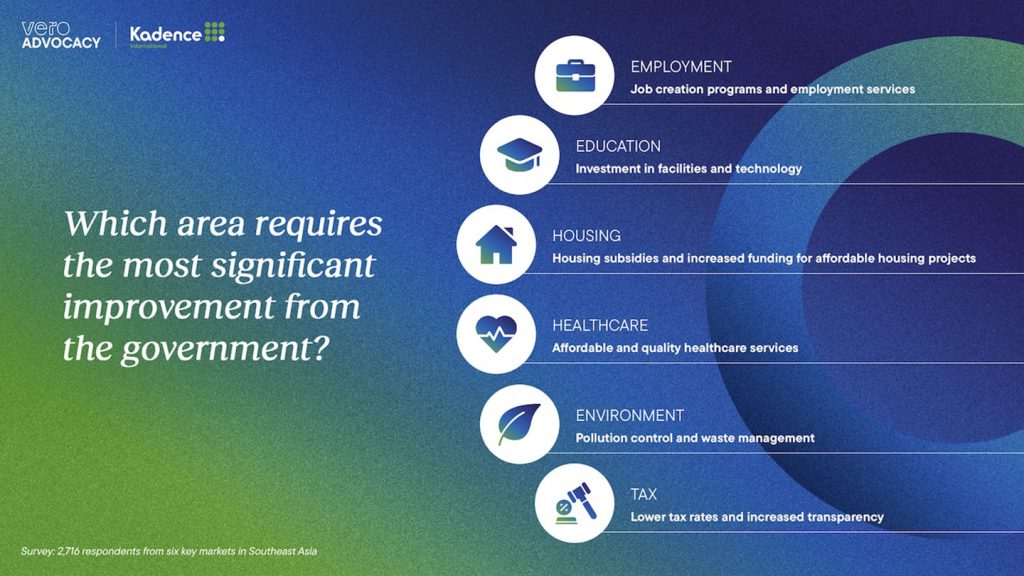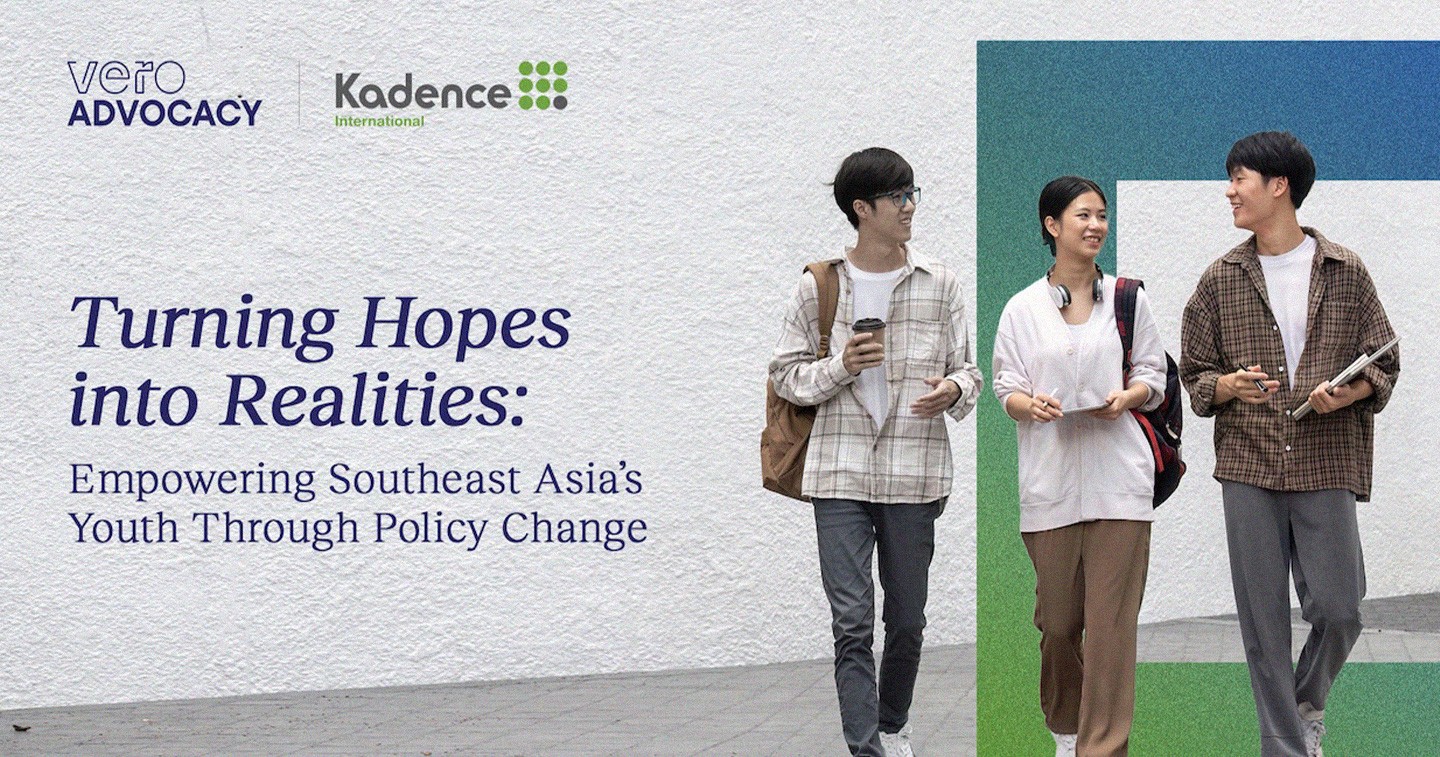MANILA, PHILIPPINES — More than four in five Filipino youth have a positive outlook for the next five years, according to a new collaborative study by Vero Advocacy and Kadence International. However, this optimism is tempered by a strong demand for urgent reforms in employment, education, and healthcare.
The study surveyed over 2,700 Gen Z and Millennials across six Southeast Asian countries, including 453 respondents from the Philippines. Vero Advocacy, a government relations arm, and Kadence International, a global market research agency, aim to explore the shared perspectives of these generations, uncovering their aspirations and challenges to help guide governments and the private sector in developing policies and initiatives that address current needs and drive long-term growth.
According to the survey, 43% of Gen Z Filipinos expect a “much better” future, and 42% anticipate a “better” life in the next five years – only slightly higher than the combined optimism rate of Millennial Filipinos, which stands at 84%. Overall, Filipino youth are more optimistic than their peers in Singapore (69%) and Malaysia (77%), with similar levels of hope for the future as young people in Indonesia (89%), Vietnam (89%), and Thailand (87%).


Both Gen Zs and Millennials in the Philippines, however, identified employment opportunities, quality education, and accessible healthcare as their top challenges. Though these issues are prevalent across the surveyed markets, satisfaction rates for these three areas of concern were the lowest among Filipino respondents. Other concerns include environmental protection, affordable housing, and effective taxation and resource management.
Employment opportunities – or the lack thereof – create uncertainty
Many young Filipinos feel uncertain about their professional futures, with 35% of Gen Z and Millennial respondents expressing a dissatisfaction over job security. Indeed, Filipino youth were the least satisfied with job security among the six countries surveyed, with a 29% satisfaction rate that lags far behind the second lowest satisfaction rate of 43% for Malaysia.
It comes as no surprise, then, that 31% of Gen Z Filipinos and 36% of Millennial Filipinos ranked employment opportunities as the top challenge they face, with most citing a lack of jobs as a key issue. For these young generations, securing a stable job is directly tied to achieving a stable life, as it ensures not just the ability to meet daily needs, but also long-term access to healthcare, housing, and further education.
To help address this issue, Filipino youth are calling for job creation programs and better employment services like career counseling and job placement schemes. These can provide students with the mentorship and opportunities they need to succeed in their chosen careers. Many also feel that additional training and education can help bridge the gap between workers and employers, helping young people align their skills with the evolving work landscape and establish sustainable careers.
High education costs education limit opportunities for Filipino youth
As with job security, Filipinos are the least satisfied with the cost of education in the region, with a satisfaction rate of 43% for Gen Z and 38% for Millennials.
Most respondents cited high costs as the main impediment to accessing quality education in the country, as families must contend with not just tuition, but also other school-related expenses like books, notebooks, uniforms, daily allowance, and special projects, school year after school year. The high cost of education is one of the main reasons why many young people forego secondary and tertiary education in the country, which further limits their employment opportunities and prevents them from building stable careers—and, by extension, a stable future.
Aside from cost, 31% of Gen Z and 30% of Millennial Filipinos cite the quality of education as the top challenge faced by the country. Many believe that the government should prioritize investments in educational facilities and technology, as well as enhanced professional development for educators. Gen Z Filipinos were more likely to indicate more support for students with special needs as something they would like to see in the future, while Millennial Filipinos raise the importance of regular review of and updates to school curricula to better prepare students for the future.
Healthcare access remains elusive for Filipino youth
Despite healthcare being a constitutional right, six out of ten Filipinos die without seeing a doctor, according to statistics from the Department of Health. Access to healthcare remains elusive for most Filipinos, with 10% of Filipino Gen Zs and 14% of Filipino Millennials citing it as the top challenge faced by the country.




Similar to employment opportunities and education costs, Philippine satisfaction rates for healthcare are the lowest in the regional survey, with only 36% of Filipino youth (39% of Gen Z and 34% of Millennials) saying they are satisfied with the current healthcare system in the country. 50% indicate that the high costs of healthcare services and treatments are a major challenge to accessing healthcare, while 25% point to the limited availability of facilities and equipment.
To improve the situation, survey respondents feel that the government must address issues of affordability, accessibility, and quality of healthcare services in the country.
All hands in: Recommendations for public policy and private initiatives
“As Southeast Asia’s youth are poised to drive the region’s future,” explained Pongsiri Poorintanachote, Managing Partner at Vero Advocacy, “addressing these challenges is not just beneficial but essential for harnessing their full potential and ensuring a sustainable and inclusive economic growth.”
With its expertise in government relations in Southeast Asia, Vero Advocacy recognizes the essential link between youth, private stakeholders, and government. By understanding young people’s concerns, Vero Advocacy underscores the need for meaningful engagement and effective responses from governments and companies to create inclusive and sustainable policies and initiatives.
- Youth-Centric Policies – Governments should prioritize initiatives that guarantee access to quality education, expand job opportunities, and improve healthcare affordability and accessibility. By focusing on these areas, they can create a supportive environment for young people to thrive.
- Genuine Youth Engagement – It is crucial to involve young people in policy dialogues and decision-making processes. Their insights and perspectives should be actively sought, ensuring that their voices are both heard and valued in shaping policies that impact their future.
- Dedicated Spaces for Youth Advocacy – Establishing dedicated forums or platforms where youth can freely share their advocacy efforts is vital. These spaces should facilitate open dialogue, encourage innovative thinking, and provide opportunities for young individuals to highlight their contributions to national development.
- Support for Entrepreneurs – The private sector should develop entrepreneurial programs that leverage existing resources and expertise. By offering funding and training, businesses can nurture creativity and business acumen, empowering a new generation of innovators and leaders.
- Corporate Social Responsibility – Businesses should embed youth-centric goals into their Corporate Social Responsibility (CSR) strategies, focusing on initiatives that uplift communities and address social issues pertinent to young people. This alignment will foster a more inclusive approach to social development.

“With Gen Z and Millennials comprising over half of the Philippine population, it is critical for leaders and changemakers to listen to their needs,” said Gio Tingson, Youth Advocate and former Chairperson of the National Youth Commission. “Many of us often hear and repeat Dr. Jose Rizal’s statement about youth being the hope of the motherland. But while it is true that young people are eager to effect change, it is just as important for us to listen to them and empower them with the tools they need to succeed and build a future that is sustainable for all.”
Nattabhorn Buamahakul, Managing Partner at Vero Advocacy, added, “Southeast Asian youth are the key force driving our region’s growth. It is crucial for governments and policymakers to recognize their aspirations by actively improving their living standards and opportunities. Our shared future relies on empowering this generation to attain a better quality of life.”
Access the full report for free on the Vero website.








